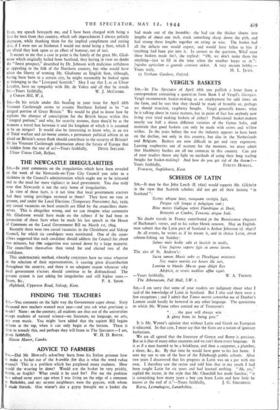THE NEWCASTLE IRREGULARITIES
Sta,In your comments on the irregularities which have been revealed on the work of the Newcastle-on-Tyne City Council you refer to a slackness in the Council's administration which ought not to be to!erated and to the need for more vigilance in local government. You also truly state that Newcastle is not the only home of irregularities.
In view of these facts, is it not time that local government electors had their voting privileges restored to them? They have no vote at present, and under the Local Elections (Temporary Provisions) Act, 1939, any casual vacancies on local councils are filled by the councillors them- selves. This is altogether wrong, and we can imagine what comments Mr. Gladstone would have made on the subject if he had been in possession of .these facts when he made his last speech in the House Of Commons on the Local Government Bill on March 1st, 1894.
Recently there were two casual vacancies in the Chislehurst and Sidcup Council, for which six candidates were nominated. One of the coun- cillors suggested that each candidate should address the Council for about two minutes, but dist suggestion was turned down by a large majority. The councillors themselves then voted for and elected two of the candidates.
This undemocratic method, whereby ratepayers have no voice whatever in the selection of their representatives, is causing great dissatisfaction throughout the country, and there is no adeqbate reason whatever why local government e'ectors should continue to be disfranchised. The present system is just asking for irregularites and still higher rates.— Yours, 8rc.,' P. A. SHAW. Highfield, Upperton Road, Sidcup, Kent.


























 Previous page
Previous page